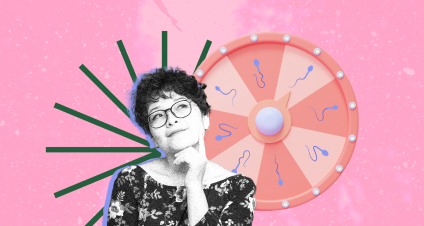Trying to navigate perimenopause can sometimes feel like being dropped into a foreign country where you not only don’t speak the language but your Google Translate isn’t working either.
Q: “When does perimenopause start?”
A: “It’s different for everyone!”
Q: “What does perimenopause feel like?
A: “So some people feel like they have uncontrollable rage, but some don’t! Some experience belly fat or bloating — though some don’t! Some have irregular periods, and some don’t! But those are only three of the countless potential symptoms!"
Q: “Oooh! What about hot flashes? I’m sweating through everything!”
A: “Yeah, that can happen too.”
Yep, perimenopause can definitely feel like there’s no rhyme or reason to your symptoms. What's even more confusing is just because you have a common symptom doesn’t automatically mean you’re entering perimenopause.
Unfortunately, that can be the case with hot flashes before your period. While they certainly are a common symptom of perimenopause, perimenopause itself “typically requires also having fewer regular periods within a one-year time frame,” explains Dorothy Bestoyong, DO, an OB/GYN based in Orlando, Florida. She goes on to say that it’s hard to pinpoint if hot flashes are more common in perimenopause (the transition period leading up to menopause) — or in menopause (when periods permanently stop): “Some may not experience [hot flashes] significantly until menopause,” she says. “However, more and more women who are entering perimenopause are becoming aware of symptoms and therefore are reporting [hot flashes] more.”
Regardless of your perimenopause (or menopause) status, hot flashes are a pesky health issue, and we deserve to understand them to the best of our ability. That means learning what they are, why they occur, and how we can best manage their sweaty visits. Read on for Dr. Bestoyong’s expert advice on hot flashes — specifically ones that appear right before your period.

Hot flashes before your period: A primer
According to Dr. Bestoyong, hot flashes are “a feeling of heat usually starting in the chest or face that quickly becomes generalized and lasts for two to four minutes.” They can cause sweating, heart palpitations, chills, shivering, and anxiety.
Heads up that night sweats are the same thing as hot flashes, except they occur when you’re sleeping. Ever wake up in the middle of the night drenched in sweat? Yeah, that’s just a hot flash happening while you’re deep in Snoozeville. Fun, right? Oh, by the way, any perimenopausal sleep problems are often due to hot flashes or night sweats too. Yay.
Dr. Bestoyong does confirm that hot flashes can be present in some perimenopausal women right before their period. This is “due to estrogen withdrawal,” she explains. However, hot flashes are not exclusive to this part of the luteal phase. “There is another time when estrogen is low during the menstrual cycle, which is after ovulation,” she says. “Some may experience symptoms then as well.” Since the luteal phase is roughly 13 days long, hot flashes can happen either early (after ovulation) or late in the phase (right before menstruation).
How to manage your hot flashes
The first step toward managing hot flashes is identifying potential lifestyle triggers. Dr. Bestoyong lists the following risk factors that can worsen hot flashes:
- Alcohol
- Spicy foods
- Stress
- Smoking
- Reduced physical activity
In addition to avoiding these triggers, Dr. Bestoyong offers these suggestions for staying cool when and if a hot flash occurs:
- Consider wearing layers
- Using fan/air conditioning
- Sleeping in a cool bedroom
- Mindfulness practices/breathwork/yoga
- Talking with your doctor about treatment options if lifestyle changes are not enough

When is it time to see a doctor?
If you’ve avoided all of the listed triggers and tried Dr. Bestoyong’s recommended lifestyle changes, and hot flashes are still controlling your day-to-day existence, it's probably time to make an appointment with your healthcare provider. Rest assured that you’re not alone if this is the case: About 10 to 15% of women experience severe hot flashes.
“Your doctor should rule out other causes like thyroid abnormalities, or premature menopause when hot flashes are extremely bothersome and happening before you typically expect it,” says Dr. Bestoyong.
Once your physician has ruled out any other potential causes of irritating hot flashes, you can discuss medication options.
“There are hormonal and non-hormonal medications available,” says Dr. Bestoyong. If you’re thinking about going the hormonal route, she says “hormone replacement therapy (HRT) can be helpful if you are a candidate.” Non-hormonal medication options include gabapentin, or “an SSRI like paroxetine, which can help lessen symptoms,” says Dr. Bestoyong. As always, talk to your doctor to determine the best option for you.

Hot flashes can be one of the worst parts of perimenopause and menopause, no doubt. But as Dr. Bestoyong says, the fact that more women are reporting this symptom in perimenopause just goes to show how important it is that we don’t shy away from this natural — albeit annoying — transitional symptom. The more we talk about hot flashes, the better we can manage them.
Sarene Leeds holds an M.S. in Professional Writing from NYU, and is a seasoned journalist, having written and reported on subjects ranging from TV and pop culture to health, wellness, and parenting over the course of her career. Her work has appeared in Rolling Stone, The Wall Street Journal, Vulture, SheKnows, and numerous other outlets. A staunch mental health advocate, Sarene also hosts the podcast “Emotional Abuse Is Real.” Subscribe to her Substack, the Critical Communicator, and follow her on Instagram, BlueSky, or Threads.








.webp)


















